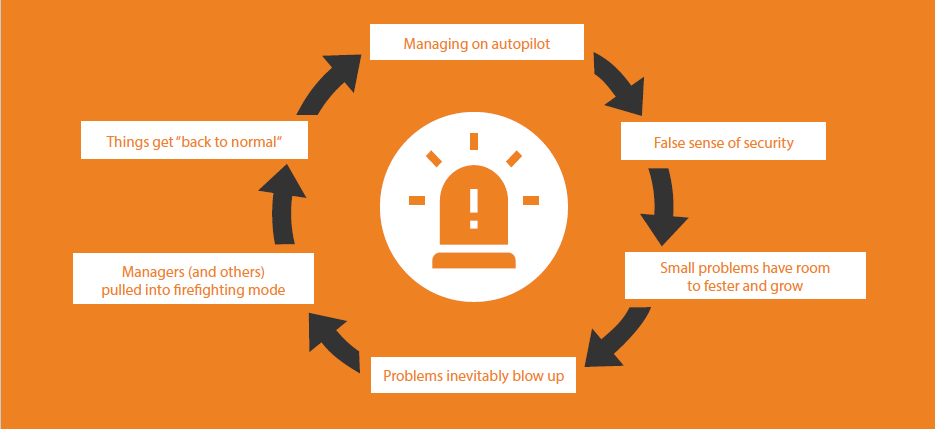Blog
Break Free from the Vicious Cycle of Undermanagement
Managers who are convinced they don’t have time to manage almost always spend lots of time managing people anyway. That’s because whenever a manager avoids spending time up front making sure things go right, then things almost always go wrong. Small problems pile up and grow until they become so big that they cannot be ignored. By that point, the manager has no choice but to chase down the problems and solve them.
These managers run around solving problems that never had to happen, getting big problems under control that should have been solved easily, recouping squandered resources, dealing with long-standing performance problems, and feeling even more pressed for time. In all likelihood, they will go right back to managing on autopilot, and the next time they’ll make time for more engaged management is the next time there is another big problem to chase down and solve.
[BREAK THE VICIOUS CYCLE DOWNLOAD THE UNDERMANAGEMENT EPIDEMIC REPORT]
Managing in Firefighting Mode
We call this “managing in firefighting mode.” Sadly, the vast majority of managers spend an inordinate percentage of their management time in firefighting mode, solving one urgent problem after another – usually problems that could have been avoided with better planning, or identified and solved more easily at an earlier point.
As any manager will tell you, firefighting is part of the job. It’s very hard to break the cycle because when there is an urgent problem, it simply must be addressed. Things do go wrong – fires occur. If you are the manager, you are in charge, which means it’s up to you to lead the firefight. But it’s usually difficult, time-consuming work. By the time you are done, you are way behind on all of the other work you were supposed to be doing.
[LOOKING FOR MORE LEADERSHIP TIPS? DOWNLOAD THE MANAGEMENT FUNDAMENTALS EBOOK]
Why So Many Managers Get Caught in the Vicious Cycle
The vast majority of managers do their managing more or less on autopilot until something goes wrong, which it almost always does. Then communication becomes more heated and urgent, which may work in the moment, but doesn’t address the larger issue.
Managers tell us all the time, “Everything is going just fine. It’s just that we have a lot of fires to put out and that makes it very hard to get into a good routine. Whenever you get into a good routine, pretty soon there is another fire.”
What they don’t realize is that they are stuck in a vicious cycle of undermanagement:

How do you break free from the vicious cycle? Those regular one-on-ones are your fire prevention, preparation, and training. That’s where real impact occurs. Not in the “crucial conversations,” but rather in the routine conversations. First you need to make those routine conversations much, much better.
That’s it. Just the back-to-basics fundamentals — practiced consistently with rigor and discipline.
[TAKE YOUR 1:1S TO THE NEXT LEVEL DOWNLOAD THE STRONG LEADER’S GUIDE EBOOK]
